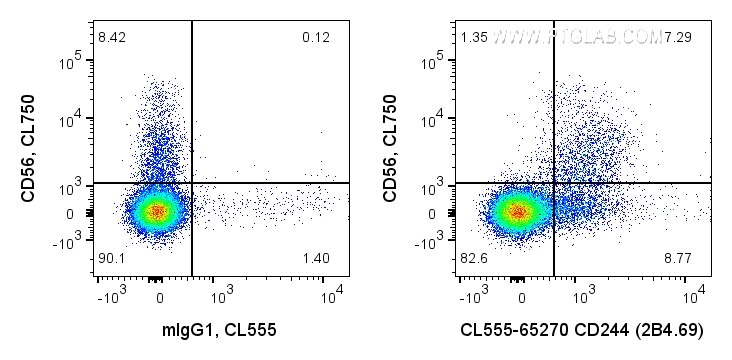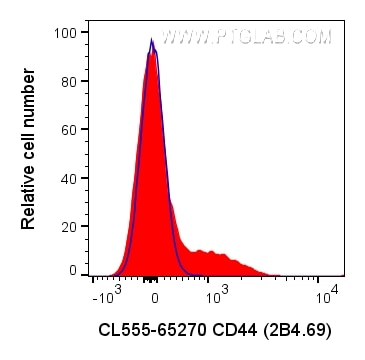CD244 Monoklonaler Antikörper
CD244 Monoklonal Antikörper für FC
Wirt / Isotyp
Maus / IgG1
Getestete Reaktivität
human
Anwendung
FC
Konjugation
CoraLite® Plus 555 Fluorescent Dye
CloneNo.
2B4.69
Kat-Nr. : CL555-65270
Synonyme
Geprüfte Anwendungen
| Erfolgreiche Detektion in FC | humane PBMCs |
Empfohlene Verdünnung
| Anwendung | Verdünnung |
|---|---|
| This reagent has been pre-titrated and tested for flow cytometric analysis. The suggested use of this reagent is 5 ul per 10^6 cells in a 100 µl suspension or 5 ul per 100 µl of whole blood. | |
| Sample-dependent, check data in validation data gallery | |
Produktinformation
CL555-65270 bindet in FC CD244 und zeigt Reaktivität mit human
| Getestete Reaktivität | human |
| Wirt / Isotyp | Maus / IgG1 |
| Klonalität | Monoklonal |
| Typ | Antikörper |
| Immunogen | k.A. |
| Vollständiger Name | CD244 molecule, natural killer cell receptor 2B4 |
| GenBank-Zugangsnummer | BC028073 |
| Gene symbol | CD244 |
| Gene ID (NCBI) | 51744 |
| Konjugation | CoraLite® Plus 555 Fluorescent Dye |
| Excitation/Emission maxima wavelengths | 554 nm / 570 nm |
| Form | Liquid |
| Reinigungsmethode | Affinitätsreinigung |
| Lagerungspuffer | PBS with 0.09% sodium azide and 0.5% BSA |
| Lagerungsbedingungen | Store at 2-8°C. Avoid exposure to light. Stable for one year after shipment. |
Hintergrundinformationen
CD244, also known as SLAMF4 or 2B4, is a type I transmembrane glycoprotein belonging to the signaling lymphocyte activation molecule (SLAM) family. It consists of an extracellular segment with two immunoglobulin (Ig)-like domains, a transmembrane region, and a cytoplasmic domain containing tyrosine-based motifs (PMID: 9841922; 30546369). CD244 is present on natural killer (NK) cells, γδ T cells, a subset of CD8+ T cells, monocytes, basophils, dendritic cells, and myeloid-derived suppressor cells (MDSCs) (PMID: 30546369). It binds to CD48 with high affinity and transmits stimulatory or inhibitory signals that regulate immune function (PMID: 9841922; 18523281).
Protokolle
| PRODUKTSPEZIFISCHE PROTOKOLLE | |
|---|---|
| FC protocol for CL Plus 555 CD244 antibody CL555-65270 | Download protocol |
| STANDARD-PROTOKOLLE | |
|---|---|
| Klicken Sie hier, um unsere Standardprotokolle anzuzeigen |



